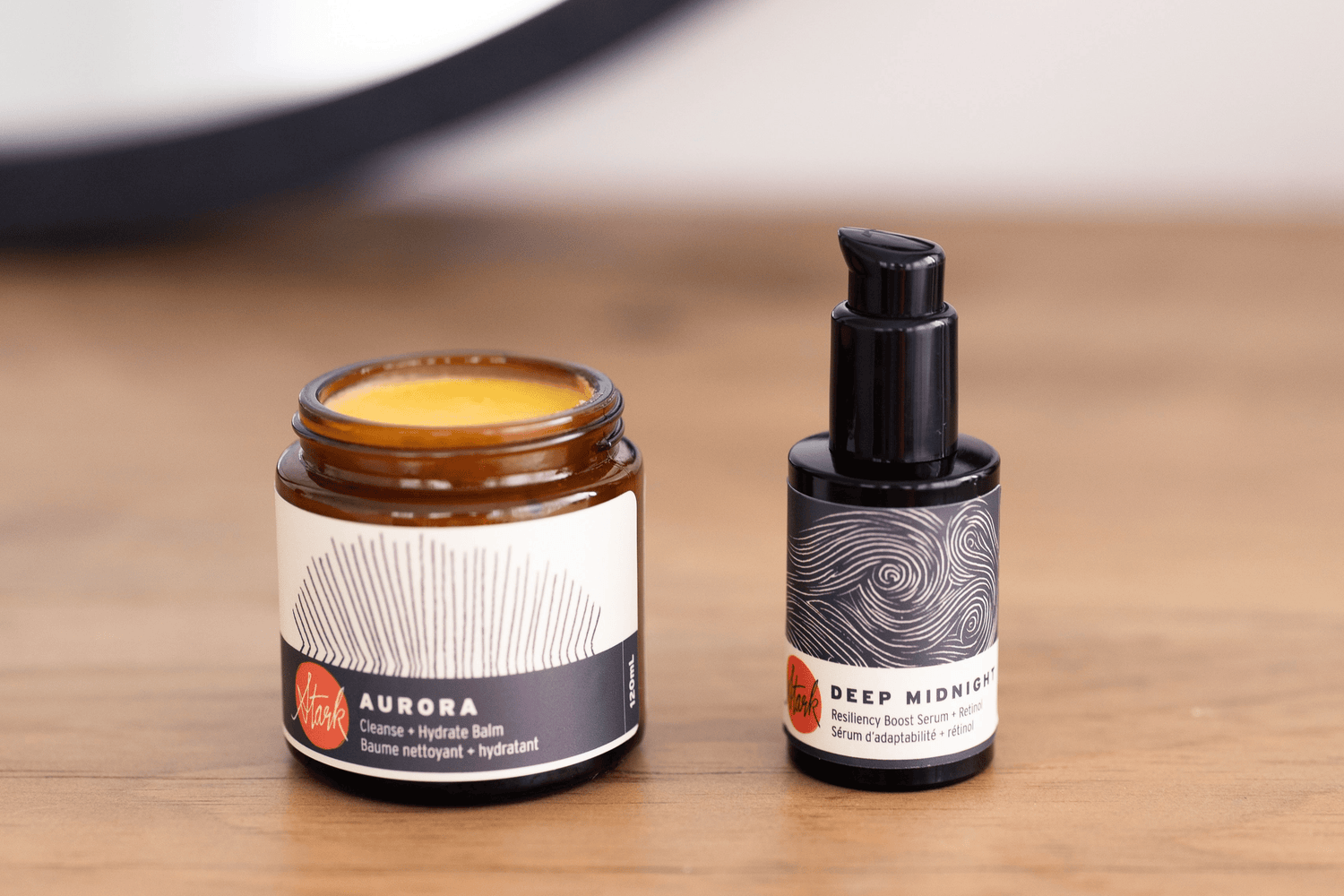
The Complete Guide to Antioxidant Skincare: What It Is, How It Works, and Which Ingredients Actually Matter
Share
Despite being a brand owner and formulator, I too have stood in front of a shelf at the pharmacy or at Sephora, absolutely stunned by the choices. There's no lack of options when it comes to skincare ingredients, brand angles, or new fears and insecurities to tap into (what's next... hating our ears? Earlobe tightening cream?)
So what is antioxidant skincare, and why is it different, and more importantly, why should you care?
Like most of us, you've probably spent hundreds of dollars on skincare products promising "renewed skin", a "youthful appearance" or an "inner glow" without really knowing how these results were ever intended on being delivered. Statistically, you may have even spent thousands. We all know the beauty industry loves to prey on fears and jump on trendy ingredient bandwagons, and it's so easy to give into the hype.
But I'm telling you, from the bottom of my heart, that antioxidants aren't just nice-to-have add-ons in skincare. They are essential and they will make a difference.
Antioxidants are your skin's daily defense system against the environmental assault that ages you faster than time itself. I'm serious. It's called extrinsic ageing. It's a major reason why not all 40-year-olds age at the same rate. But choosing effective antioxidant skincare requires understanding which ingredients actually work, how to use them properly, and how to avoid the expensive mistakes most people make.
Antioxidants aren't about transforming your skin into something it's not. They're about protecting the skin you have right now from the environmental damage that's happening every single day.
After 14+ years of formulating with antioxidants and plant-based ingredients, I'm going to explain exactly what antioxidant skincare does for your skin, which ingredients are worth your money, and how to build an antioxidant routine that actually protects rather than just sounds impressive on Instagram.
What Is Antioxidant Skincare?
Antioxidant skincare uses ingredients that neutralize free radicals - unstable molecules that damage your skin cells and accelerate aging. Think of antioxidants as your skin's bodyguards, protecting against environmental damage before it can cause lasting harm.
The simple explanation: Free radicals are molecules missing an electron, making them unstable and reactive. They steal electrons from healthy skin cells, causing damage. Antioxidants donate electrons to these free radicals, neutralizing them before they can cause harm.
Where free radicals come from:
- UV radiation (even through windows)
- Pollution and environmental toxins (including indoors!)
- Blue light from screens (minimal but measurable)
- Normal cellular metabolism
- Stress and inflammation
- Cigarette smoke and other airborne irritants
What makes skincare "antioxidant": Products containing ingredients specifically chosen for their ability to neutralize free radicals. This includes vitamins (C, E), plant extracts rich in polyphenols, and synthetic compounds designed for antioxidant activity.
The timing factor: Antioxidants work best as prevention rather than treatment. They stop damage from happening rather than reversing damage that's already occurred. This is why consistent daily use matters more than occasional intensive treatments.
What Does Antioxidant Skincare Actually Do for Your Skin?
Understanding what antioxidants do helps you use them more effectively and set realistic expectations about results.
1. Prevents Environmental Damage
UV protection support: While antioxidants aren't sunscreen, they help your skin cope with UV damage that occurs despite SPF use. No sunscreen blocks 100% of UV rays, and antioxidants help neutralize the free radicals that slip through.
Pollution defense: Urban environments expose skin to particulate matter, ozone, and other pollutants that generate free radicals. Antioxidants create a buffer against this daily assault.
Blue light protection: The research is still developing, but some antioxidants show promise in protecting against the oxidative stress from high-energy visible light.
2. Supports Skin Barrier Function
Reduces inflammation: Many antioxidants have anti-inflammatory properties that help calm skin and support barrier repair.
Preserves collagen: By preventing free radical damage to collagen-producing cells, antioxidants help maintain skin structure and firmness over time.
Enhances repair processes: Antioxidants create an environment where your skin's natural repair mechanisms can work more effectively.
3. Improves Skin Appearance
Brightens skin tone: Some antioxidants, particularly vitamin C, help fade dark spots and even out skin tone.
Reduces visible aging: Consistent antioxidant use can slow the visible signs of environmental aging like fine lines and uneven texture.
Enhances radiance: Healthy skin that's protected from oxidative stress simply looks better - more radiant and even-toned.
What Antioxidants Don't Do
1. They don't reverse existing damage: Antioxidants are protective, not corrective. They won't eliminate wrinkles or completely fade dark spots that are already there. Look for formulas that aren't one-trick ponies, like our award-winning CITY, a Vitamin C and Niacinamide oil-serum with antioxidants that also helps with hyperpigmentation and fine lines.
2. They're not immediate: Unlike exfoliating acids that show quick results, antioxidant benefits build over time with consistent use.
3. They're not sunscreen: Antioxidants support sun protection but never replace proper SPF use.
Essential Antioxidant Skincare Ingredients (And Which Ones Actually Work)
Not all antioxidants are created equal. Some are well-researched and stable, others are marketing gimmicks with impressive names but little proven benefit.
Vitamin C (Multiple Forms)
L-Ascorbic Acid: The most researched form, highly effective but unstable and potentially irritating. Requires acidic formulations (pH 3.5 or below) and careful packaging.
Magnesium Ascorbyl Phosphate: More stable, less irritating, but potentially less potent. Good for sensitive skin or those new to vitamin C. Found in our Petrichor Antioxidant Serum Mist
Sodium Ascorbyl Phosphate: Another stable form with some antimicrobial benefits, making it useful for acne-prone skin.
Tetra-hexadecyl Ascorbate: Oil-soluble, very stable, and penetrates well. Less irritating than L-ascorbic acid while maintaining effectiveness. This is why we use it in City Light Daytime Oil - all the benefits with better tolerance.
What vitamin C does: Brightens skin, supports collagen production, provides potent antioxidant protection, and enhances the effectiveness of vitamin E when used together.
Vitamin E (Tocopherols)
Mixed tocopherols: More effective than single forms, provides broad antioxidant protection and helps stabilize other antioxidants like vitamin C.
Tocopheryl acetate: More stable but needs to be converted by skin enzymes to be active. Less immediately available than natural forms.
What vitamin E does: Protects cell membranes, enhances vitamin C effectiveness, provides anti-inflammatory benefits, and helps maintain skin barrier function.
Plant-Based Antioxidants That We Love
Green tea (EGCG): Well-researched for anti-inflammatory and antioxidant benefits. Particularly effective against UV-induced damage.
Resveratrol: Potent antioxidant from grapes and berries. Shows promise for anti-aging benefits but can be unstable in formulations.
Sea buckthorn: Rich in multiple antioxidants including vitamins C and E, carotenoids, and flavonoids. Excellent for comprehensive protection.
Niacinamide: While technically a vitamin (B3), it functions as an antioxidant and anti-inflammatory. Very stable and compatible with most other ingredients.
Ferulic acid: Enhances the stability and effectiveness of vitamins C and E. Often used in combination formulations for synergistic benefits.
Berry extracts (cranberry, blueberry, elderberry, etc): Don't let the cute factor fool you - berries are antioxidant powerhouses thanks to compounds called anthocyanins (the pigments that make them colorful) and high levels of vitamin C. Cranberry seed oil is particularly impressive with its balance of omega fatty acids and antioxidants that actually penetrate skin well, and is an ingredient we love at Stark. You'll also find elderberry extract in many of our formulas, as well as other berry oils such as strawberry seed.
Synthetic Antioxidants
Idebenone: A synthetic version of CoQ10 that's more stable and potentially more effective than the natural version.
Ergothioneine: An amino acid with potent antioxidant properties. Relatively new to skincare but showing promising research.
What matters in formulation: Concentration, stability, penetration, and how antioxidants are combined. A well-formulated product with moderate concentrations of stable antioxidants will outperform a poorly formulated product with high concentrations of unstable ones.
How to Use Antioxidant Skincare Effectively
Getting the most from antioxidant skincare requires understanding timing, layering, and realistic expectations.
Morning vs. Evening Use
Morning application: Most antioxidants work best during the day when your skin faces environmental stressors. Apply antioxidants before sun exposure to maximize protective benefits.
Evening considerations: Not as necessary as daytime application, but also useful. Some antioxidants (like retinoids that have antioxidant properties) are photosensitive and work better at night. Others work fine in either routine.
Daily consistency: Antioxidant protection works best with consistent daily use rather than sporadic intensive treatments.
Layering with Other Products
With vitamin C: Apply to clean skin before heavier products. Wait a few minutes before applying products with different pH levels. Understanding proper skincare layering helps maximize antioxidant effectiveness.
With sunscreen: Always follow antioxidants with SPF during the day. Some antioxidants can enhance sun protection effectiveness.
With acids: Use with caution. Some antioxidants (like L-ascorbic acid) are acids themselves and may not play well with other acids in the same routine.
With oils: Many antioxidants are oil-soluble and work well in facial oils. Others are water-soluble and should be applied before oils.
Application Tips
Less is more: Antioxidants are potent. A little goes a long way, and using too much can cause irritation without additional benefits.
Patch test new products: Even gentle antioxidants can cause reactions in sensitive individuals. Always test new products on a small area first.
Storage matters: Many antioxidants are sensitive to light, air, and heat. Proper storage extends their effectiveness and prevents oxidation of the antioxidants themselves.
Choosing the Right Antioxidant Products
Look for stable formulations: Dark or opaque packaging, airless pumps, and products that don't change color or smell over time.
Consider your skin sensitivity: If you have sensitive skin, start with gentler antioxidants like niacinamide or stable vitamin C forms rather than L-ascorbic acid.
Think about your lifestyle: If you're frequently outdoors or in polluted environments, you might benefit from more comprehensive antioxidant protection like Petrichor Antioxidant Serum Mist that you can reapply throughout the day.
Common Antioxidant Skincare Myths and Mistakes
Myth 1: "More Antioxidants Always Means Better Protection"
The reality: Your skin can only utilize so many antioxidants at once. Using multiple high-concentration antioxidant products simultaneously often leads to irritation without additional benefits.
The better approach: Choose one or two well-formulated antioxidant products rather than layering multiple antioxidant serums.
Myth 2: "Natural Antioxidants Are Always Better Than Synthetic"
The truth: Some synthetic antioxidants are more stable, potent, and better-researched than their natural counterparts. What matters is effectiveness and safety, not origin.
Example: Synthetic vitamin C forms like tetra-hexadecyl ascorbate often cause less irritation than natural L-ascorbic acid while providing similar benefits.
Myth 3: "Antioxidants Can Replace Sunscreen"
Wrong: While some antioxidants provide modest UV protection, they're nowhere near sufficient to replace proper broad-spectrum SPF. Think of antioxidants as sunscreen's supportive partner, not its replacement.
Myth 4: "You Only Need Antioxidants If You Live in a Polluted City"
Not true: Even in clean environments, your skin produces free radicals through normal metabolism. UV exposure happens everywhere. Antioxidant protection benefits everyone, regardless of location.
Myth 5: "Expensive Antioxidant Products Are Always More Effective"
Reality check: Some of the most effective antioxidants (like niacinamide) are relatively inexpensive. Price often reflects packaging, marketing, and brand positioning rather than antioxidant potency.
Building an Effective Antioxidant Routine
For Beginners
Start simple: Choose one gentle antioxidant product like a niacinamide serum or stable vitamin C oil. Use it consistently for 4-6 weeks before adding anything else.
Morning routine: Antioxidant product → moisturizer or face oil → SPF
Watch for reactions: Any persistent redness, stinging, or irritation means you should stop use and possibly choose a gentler alternative.
For Intermediate Users
Combine complementary antioxidants: Vitamin C + E work synergistically. Green tea + niacinamide provide comprehensive protection.
Consider timing: Some antioxidants work best in morning routines, others can be used morning or evening.
Adjust seasonally: You might need more antioxidant protection in summer (more UV) or winter (more indoor heating and dry air).
With our Stark products, you can simply combine Petrichor and City as an amazing antioxidant duo for the day. At night, Equinox and Midnight are an incredible pair.
For Advanced Users
Layer strategically: Use water-soluble antioxidants before oil-soluble ones. Consider pH compatibility when combining multiple actives.
Customize for your environment: Urban dwellers might benefit from pollution-fighting antioxidants, while those in sunny climates might focus on UV-protective ones.
Track your skin's response: Advanced users can experiment with different antioxidant combinations while carefully monitoring their skin's reaction.
Frequently Asked Questions About Antioxidant Skincare
Q: What's the best time to apply antioxidant skincare? A: Most antioxidants work best in the morning before environmental exposure. However, some (like certain retinoids) are photosensitive and should be used at night. Check your specific product recommendations.
Q: Can I use multiple antioxidant products at once? A: You can, but start slowly. Using too many antioxidant products simultaneously can cause irritation. It's often better to use one well-formulated product with multiple antioxidants than several separate products.
Q: How long does it take to see results from antioxidant skincare? A: Antioxidants work gradually. You might notice improved skin texture or brightness within 4-6 weeks, but the main benefits are protective and build over months and years of consistent use.
Q: Are antioxidants safe for sensitive skin? A: Many are, but it depends on the specific antioxidant and formulation. Niacinamide and stable vitamin C forms are generally well-tolerated. L-ascorbic acid can be irritating for sensitive skin. (We don't use L-Ascorbic or Ascorbic at Stark....too bitey, cheap and unstable. Like me! Kidding lol)
Q: Do I need different antioxidants for different skin concerns? A: Not necessarily. Most antioxidants provide broad protection. However, some have additional benefits - vitamin C for brightening, niacinamide for oil control, green tea for inflammation.
Q: Can antioxidants expire or go bad? A: Yes. Many antioxidants are sensitive to light, air, and heat. Signs of oxidation include color changes, unusual smells, or skin irritation from products that previously felt fine.
Q: Are oral antioxidant supplements better than topical ones? A: For skin benefits, topical application is generally more effective. Oral antioxidants benefit overall health but don't necessarily reach skin in the same concentrations as topical application.
Q: Can I make my own antioxidant skincare? A: It's not recommended. Many antioxidants are unstable and require specific formulation techniques to remain effective. DIY products are unlikely to provide the same benefits and may even cause irritation.
Q: Do I need antioxidants if I already use sunscreen? A: Yes. Sunscreen blocks most but not all UV rays, and antioxidants help address the damage that gets through. Plus, they protect against non-UV sources of free radicals like pollution and normal metabolism.
Q: Which is more important: antioxidants or retinoids? A: Both serve different purposes. Antioxidants prevent damage, retinoids help repair existing damage and boost cell turnover. Many people benefit from using both, either in the same routine or alternating.
The Bottom Line on Antioxidant Skincare
Antioxidant skincare isn't about following trends or using the most exotic ingredients. It's about understanding how environmental damage occurs and using proven ingredients to prevent it. It's about what's happening in the here and now, and addressing that.
The most effective antioxidant routine is one you'll use consistently. A simple, well-formulated product used daily will always outperform an elaborate routine you abandon after two weeks.
Your skin faces oxidative stress every day. Giving it the tools to fight back - through thoughtfully chosen antioxidant ingredients - is one of the smartest long-term investments you can make in your skin's health and appearance.
Start simple, be consistent, and let the science work over time. Your future skin will thank you for the protection you provide today.
Citations:
- Pinnell, S.R. (2003). Cutaneous photodamage, oxidative stress, and topical antioxidant protection. Journal of the American Academy of Dermatology, 48(1), 1-19.
- Burke, K.E. (2007). Interaction of vitamins C and E as better cosmeceuticals. Dermatologic Therapy, 20(5), 314-321.
- Afaq, F., & Katiyar, S.K. (2011). Polyphenols: skin photoprotection and inhibition of photocarcinogenesis. Mini Reviews in Medicinal Chemistry, 11(14), 1200-1215.
- Chen, L., et al. (2012). The role of antioxidants in photoprotection: A critical review. Journal of the American Academy of Dermatology, 67(5), 1013-1024.




